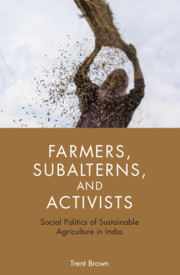Book contents
- Frontmatter
- Dedication
- Contents
- List of Images
- Acknowledgements
- 1 Introduction
- 2 India's Agrarian Crisis: A Gramscian View
- 3 Embedded in Power: Potentials and Constraints of Sustainable Agriculture
- 4 The Kheti Virasat Mission: People's Movement or Agrarian Populism?
- 5 The Tamil Nadu Organic Farmers’ Movement: The Limits of Participatory Approaches
- 6 The Beej Bachao Andolan: How ‘Grassroots’ is the Grassroots?
- 7 Conclusion
- Bibliography
- Index
7 - Conclusion
Published online by Cambridge University Press: 08 July 2018
- Frontmatter
- Dedication
- Contents
- List of Images
- Acknowledgements
- 1 Introduction
- 2 India's Agrarian Crisis: A Gramscian View
- 3 Embedded in Power: Potentials and Constraints of Sustainable Agriculture
- 4 The Kheti Virasat Mission: People's Movement or Agrarian Populism?
- 5 The Tamil Nadu Organic Farmers’ Movement: The Limits of Participatory Approaches
- 6 The Beej Bachao Andolan: How ‘Grassroots’ is the Grassroots?
- 7 Conclusion
- Bibliography
- Index
Summary
Every crisis is an opportunity for change: an opportunity to rethink and reconfigure arrangements that have long since become defunct. A widespread agrarian crisis in rural India has provided an opportunity to rethink patterns of rural development that have failed to yield sustained benefits for most of the rural population. Insofar as this agrarian crisis has developed into a ‘crisis of authority’—a weakening of the bonds of consent on which hegemony is based—it has offered a dual opportunity. For historically subaltern groups, it has been an opportunity to reconfigure power relations in a manner that runs counter to the established hegemony and to propose alternatives that might be more in their long-term interests. Yet, for hegemonic groups, it is an opportunity to further consolidate their power: capitalising on widespread desperation to push through reforms that facilitate further cycles of accumulation.
Throughout this book, I have attempted to assess whether sustainable agriculture initiatives in India tend to support a counter-hegemonic agenda of the rural subaltern or, alternatively, whether they align more with the existing hegemonic configuration. The case studies presented show that sustainable agriculture, though lauded as the solution to a pervasive agrarian crisis, is a project that, in many ways, is woven into the fabric of the same hegemonic structure that has produced the crisis in the first place. Though the ideology of sustainable agriculture initiatives often reflects its ‘promise’ as a pathway to greater farmer autonomy, a cornerstone of ‘food sovereignty’, and a challenge to corporate control in agriculture, the institutional context within which sustainable agriculture projects are implemented often results in this promise remaining unfulfilled. Because of their continued dependency on hegemonic groups, sustainable agriculture initiatives in the Indian context often deliver results that are either ineffective or further entrench existing power structures.
In this final chapter, I would like to suggest two major implications of these findings, which speak to two distinct audiences. For those within the development establishment, particularly those with an earnest commitment to delivering results that are effective, sustainable, and equitable, the findings suggest a need to rethink the best pathways to inclusive and sustainable development.
- Type
- Chapter
- Information
- Farmers, Subalterns, and ActivistsSocial Politics of Sustainable Agriculture in India, pp. 167 - 180Publisher: Cambridge University PressPrint publication year: 2018



